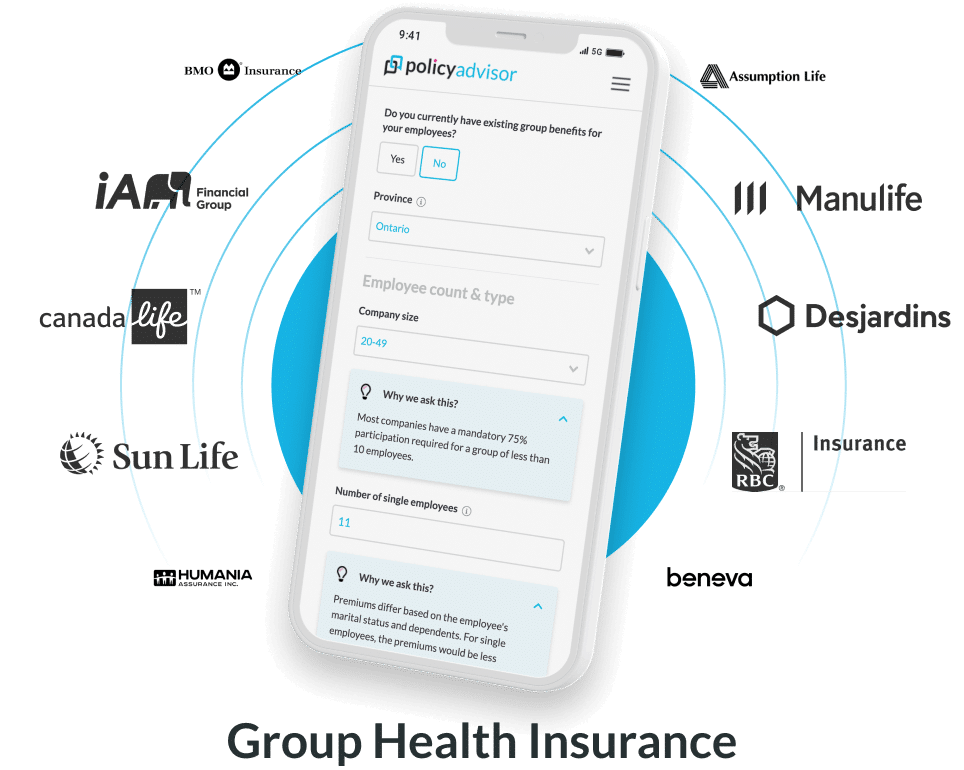- 1 in 7 Canadians identify as having a disability and 33 percent of workers aged between 30-64 are likely to experience some kind of disability for more than 90 days
- Group disability insurance is a financial safety net for your employees if they are unable to work due to a non-job related disability
- There are two types of group disability plans: Short-term disability(STD) and Long-term disability (LTD)
- Understanding what constitutes a disability in a group benefits plan is important for both employers and employees
- Most insurers divide the definition of disability into two major parts—inability to perform regular job duties or occupation and inability to get gainful employment
Physical disability can be an uncomfortable topic of discussion for anyone. More so for people in their prime earning years who are oblivious to the dangers of a physical disability. As per the Canadian Survey on Disability (CSD), 1 in 7 Canadians identify as having a disability and 33 percent of workers aged between 30-64 are likely to experience some kind of disability for more than 90 days—this makes group disability insurance an important employee benefit.
Employers who value their employees will also want to protect their physical well-being. Group disability insurance helps in doing just that.
What is group disability insurance?
Group disability insurance is a financial safety net for your employees if they are unable to work due to a non-job related disability. An employee with group disability benefits will receive a portion of their income during this difficult time so they can focus on getting better.
Most insurers replace a certain percentage of an employee’s regular income. Depending on the group disability plan, the benefit amount is paid on a weekly or monthly basis. Typically, an employee will receive group disability benefits until they have recovered and resumed working.
Why is group disability insurance important?
Types of group disability insurance coverage
There are two types of group disability plans:
- Short-term disability (STD)
- Long-term disability (LTD)
Group short-term disability benefits
When we talk about disability, we usually think of things like paralysis, cancer, or a serious injury. However, there are certain conditions for which recovery might take anywhere between 15-26 weeks. These are the conditions that are covered under a short-term disability insurance plan.
While the definition of disability and the coverage options can vary from one insurer to another, most group disability insurance plans cover the following common issues:
Group long-term disability benefits
Long-term group disability benefits replace an employee’s income if they are unable to work due to a major illness, accident, or injury. Depending on the plan that is being offered, long-term group health insurance benefits can replace employee incomes up to the age of 65.
Similar to how short-term plans work, group long-term disability insurance coverage varies depending on the plan and the insurer. Most long-term group disability plans will typically cover:
Are both long- and short-term group disability benefits necessary?
Most group disability plans cover LTDs but not STDs. This is mostly due to budgets and priorities. In our opinion, this also often makes sense. Many short-term disabilities can be covered under a group health plan or employment insurance which is a mandatory employee benefit. So if employers choose not to offer STDs that is okay.
LTDs on the other hand are very important. Any employee who is unable to work for a longer period of time due to a disability will need all the help that they can get. An STD will help them and their loved ones deal with any financial issues while the disabled employee can focus on rehabilitation.
Know more about how group health benefits work
How group disability insurance works
Employees covered under a group disability insurance plan are entitled to receive a weekly or monthly benefit amount in the event of a disability. Depending on the terms of the plan, the disability benefit can be availed after the waiting or elimination period.
Here is how group disability insurance typically works in Canada:
- An employee who wants to claim a disability payout will fill in the required paperwork
- Following the approval of the documentation, the employee receives an insurance card
- This may be followed by a waiting period during which the insured cannot make a disability claim. The waiting period may vary depending on the type of disability insurance. For short-term disability, there is no waiting period long term disabilities may have a waiting period
- After successful completion of the waiting period (if any), the insured individual can successfully make a claim and receive coverage anytime within the term period if their disability is recognized by their policy
It is important to note that the insured individual or their family will receive a percentage of the coverage periodically until they have recovered. The payout may be weekly in the case of short-term disability insurance and monthly in the case of long-term disability insurance.
How to file a group disability insurance claim?
Filing a group disability insurance claim in Canada involves steps like notifying your employer, obtaining and submitting forms, and finally awaiting your insurer’s decision and receiving the benefits.
- Inform your HR department or benefits administrator as soon as possible about your disability and intent to file a claim
- Obtain the required claim forms from your employer or insurer, which typically include an employee statement detailing your condition, an employer statement confirming your employment and salary, and an attending physician’s statement providing medical documentation
- Complete your portion of the forms accurately and submit them along with any required medical records. Your employer may handle the submission to the insurer
- Wait for the insurer to review your claim, which may involve additional medical evaluations or requests for further documentation. This process can take several weeks
- If your claim is approved, you will receive benefits based on the policy’s waiting period and benefit calculation. If denied, you can appeal the decision with additional medical evidence
What is the definition of disability for an employee benefits plan?
Which conditions are considered disabilities?
Disabilities typically include conditions that prevent a person from performing their job due to illness, injury, or chronic conditions. These can be classified as:
- Physical disabilities – Injuries (e.g., fractures, spinal injuries), chronic pain, arthritis, heart disease, or neurological disorders like multiple sclerosis
- Mental health conditions – Depression, anxiety, PTSD, or other psychological disorders that impact the ability to work
- Serious illnesses – Cancer, stroke, or organ failure that requires long-term treatment and recovery
You must bear in mind that each insurer has specific definitions and criteria, often outlined in their policy. Some plans cover only total disability, while others include partial disability benefits for those who can work in a reduced capacity.
What conditions are not considered as a disability?
The inability to work due to any major illness, injury, or accident is considered to be a disability and can be covered under employee benefits plans. But there are conditions that simply do not qualify as a disability. Some of these are:
These conditions are not covered in group or individual disability insurance plans.
Should employers offer group disability benefits?
Group disability insurance is not a mandatory employee benefit. That being said, any employer who wants to hire and retain top talent should consider adding this to their group health benefits plan. A group disability insurance plan shows that an employer truly values and cares for their employees during the latter’s most difficult time.
Advantages of a group plan
The key advantages of a group disability insurance plan are:
- Affordable premiums: Group health insurance plans can usually be availed at a lower premium than traditional health insurance plans
- Tax benefits: Group disability insurance offers tax benefits for both employers and employees alike
- Coverage for pre-existing conditions: Group disability insurance plans often cover pre-existing medical conditions without many medical examinations, unlike individual plans, which may have thorough medical exams and waiting periods
- Easier enrollment: Employees are automatically enrolled into group disability insurance plans as a part of their onboarding, streamlining the entire procedure
- Cashless claims: Employees can avail of cashless treatment at the insurer’s network hospitals, simplifying the claims process
- Coverage for dependents: Many group plans extend coverage to employees’ family members, such as spouses and children, providing comprehensive protection
- Portability: Through a group disability insurance plan, employees may be able to take coverage with them if they leave the company without any hassle
- Flexibility: Group insurance plans can be customized according to an employer’s unique needs, making it an ideal choice for both employees and employers
Learn more about the various types of group health insurance through our detailed blog
Drawbacks to group disability plans
Although group disability plans have a plethora of benefits, there may be a few drawbacks that individuals may want to consider:
- Strict disability definition: Many insurance companies have a strict definition of disability, which may make receiving a payout very difficult if the insured does not qualify for the terms of disability set by the company
- Limitation in tax benefits: If the employer pays the complete premium amount on behalf of the employee, any benefits received by the employee are considered under taxable income
- Dependence on employer for continuity: Employees are dependent on their employer for the continuation of their health coverage
- Benefit caps: Group disability insurance benefits usually have a capped benefit amount. This may not completely replace high-income salaries
Rehabilitation and return to work programs
Many group health insurance and disability plans provide complete rehabilitation and return-to-work programs or workshops that can help individuals build confidence and get started with their lives easily.
Some of the most prominent return-to-work strategies offered by most insurance companies include:
- Rehabilitation programs
- Work-based incentives
- Accommodation benefits
- Access to health and wellness resources
- Constant progress monitoring and support
These benefits can make the transition back to work life smoother and more streamlined for the employees.
Building a group disability benefits plan
We know it’s not easy for anyone to discuss disability. But the statistics are stacked against us and with an increasing number of Canadians who are facing disability issues, it’s time to have a real conversation about it.
Our licensed advisors help employers build group benefits plans that will meet the organization’s budget and coverage needs of the employees. Speak to us today, answer a few simple questions about your business, and we’ll help build a plan for you and your employees.
Frequently Asked Questions
How does disability insurance work in Canada?
Most insurers in Canada replace a certain percentage of an employee’s wages during the length of the disability. Depending on the group disability insurance plan, the benefit amount is paid on a weekly or monthly basis. Typically, an employee will receive group disability benefits until they have recovered and resumed working.
Is group disability insurance a taxable benefit?
If an employer pays all or part of a group disability insurance premium, then it will be a taxable benefit for the employee. However, if the premiums were paid by the employee through paycheque deductions, it would not be a taxable benefit.
What is group long-term disability insurance?
Long-term group disability benefits replace an employee’s income if they are unable to work due to a major illness, accident, or injury. Depending on the plan that is being offered, long-term group health insurance benefits can replace employee incomes up to the age of 65.
Who is eligible for group disability insurance in Canada?
Employees who are part of an employer-sponsored benefits plan are generally eligible for group disability insurance. Eligibility often depends on factors like full-time or part-time status, minimum working hours, and completion of a probationary period. Some plans may also require employees to actively be at work on the policy’s effective date.
Can an employer modify or terminate group disability insurance benefits?
Yes, an employer can modify or terminate group disability insurance benefits, but changes must follow the terms outlined in the benefits plan. Employers typically review coverage during renewal periods and may adjust benefits due to cost considerations, business needs, or insurer policy changes.
What happens to my group disability insurance if I leave my job?
Group disability insurance coverage usually ends when employment ends. Some policies offer conversion options, allowing employees to switch to an individual disability plan without medical underwriting. It’s important to review options before leaving a job to avoid gaps in coverage.
How do benefit amounts get calculated for group disability insurance?
Benefit amounts are typically based on a percentage of the employee’s pre-disability income, commonly 60% to 85% of salary. Some plans have maximum benefit caps, and benefits may be reduced by other sources of income, such as government disability programs.
What are the typical waiting periods for claiming group disability insurance benefits?
The waiting period, also called the elimination period, commonly ranges from 30 to 180 days. Short-term disability plans often have shorter waiting periods (e.g., 7 to 14 days), while long-term disability plans require a longer period before benefits start. Employees should plan financially for this gap before benefits begin.
Talking about disability is not easy for anyone, especially those at the peak of their earning years who considered themselves to be truly invincible. However, a disability can sneak up on anyone at any time. So it’s best to stay prepared. Employers can help their employees do just that by offering a group disability insurance plan.






